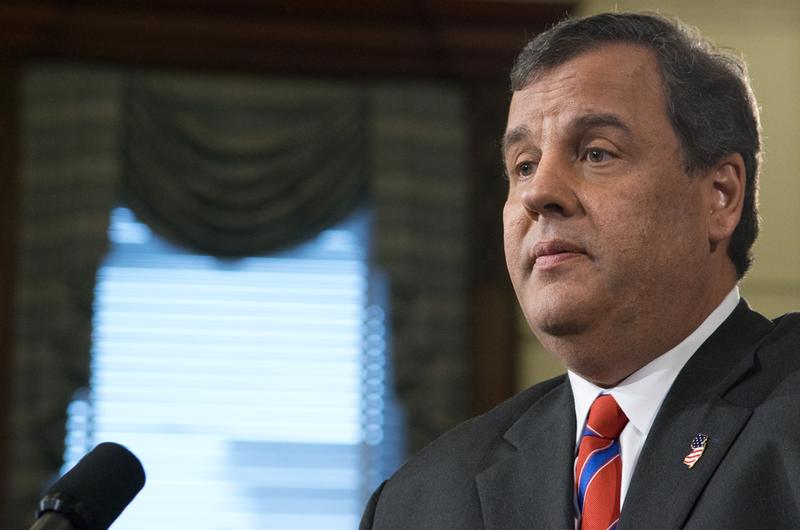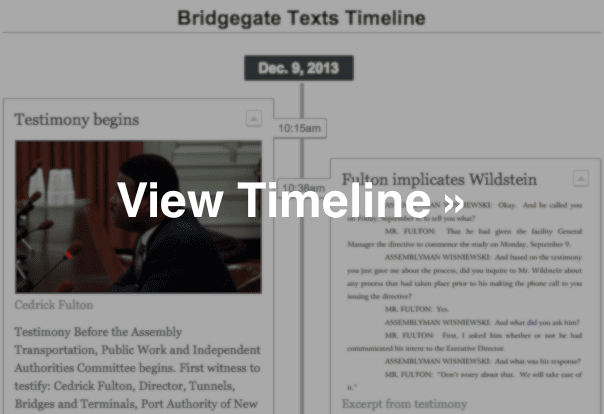
A year ago, a New Jersey legislative committee held a hearing that blew the lid off official explanations of four days of traffic jams at the George Washington Bridge. It would be another month before the cause of the lane closures was traced back to an email from Gov. Chris Christie’s deputy chief of staff. And the governor still maintains he didn’t pay much attention to the controversy until he found out he was lied to by Deputy Chief of Staff Bridget Ann Kelly.
But newly disclosed phone records - supplied by AT&T to the New Jersey legislature and obtained by WNYC - show that Christie's current Chief of Staff, Regina Egea, communicated by cell phone with Gov. Christie 12 times during that hearing on December 9, 2013. The Governor initiated the contact, about 30 minutes into the testimony, and sent a total of three texts to the aide. Egea replied nine times before the testimony concluded. The records show only one other text from Egea to Christie that month, on Christmas Day.
A timeline of the testimony, created by WNYC based on recordings of the hearing and tweets sent that day, shows that around the time of the text messages, witnesses delivered some of their sharpest blows to the Christie administration’s version of the Bridgegate events.
The new evidence contrasts with a report the governor's legal team issued last March, which did not reveal any texts about the lane closures sent from Christie to anyone from September 2013, when the Fort Lee traffic tie-ups occurred, through January. And it contradicts the sworn testimony of Egea that there was only one text from her to Christie that day.
Egea testified at another legislative hearing, in July, that she “might” have texted the governor once during the December testimony concerning the “professional” demeanor of Port Authority staff. Under repeated questioning from lawmakers, she said specifically that she hadn't heard back from the governor, and she held to the assertion that there was just one text.
Neither Egea’s lawyer, Michael Martinez, nor Christie’s lawyer, Randy Mastro, returned repeated requests for comment on the discrepancy. Neither did several representatives of the governor's office.
AT&T says it no longer has the content of the texts, so it’s impossible to say with certainty if the two discussed the bridge scandal. Egea testified she “did not retain” the one text she acknowledged. Asked about the text in August, Christie told reporters “I have no recollection of it at all,” adding, “it obviously was something of no moment or no import.” When WNYC filed a request under the state's Open Public Records Act for all texts between the governor and Egea in December 2013, the administration responded that there were "no responsive records."
Legislators investigating the Bridgegate affair have repeatedly pressed for information about the governor's communications. In its interim report on the matter obtained by WNYC and expected to be released today, the legislative select committee said that "counsel for [the Office of the Governor] indicated that it has been unable to locate any such texts on either the Governor or Egea's mobile telephones. Given Egea's testimony and the AT&T records, there is little doubt the texts were composed and transmitted. [The Office of the Governor's] inability to provide their contents indicates that both Egea and Gov Christie deleted the message at some unknown point."
It's hard to overstate the impact of last December's hearing on those who follow New Jersey government and politics. Member of the Port Authority's professional staff were systematically taking apart the Christie Administration’s explanation that the lane closures were part of a traffic study gone awry. Instead, they testified, managers at the George Washington Bridge warned a Christie point man at the Port Authority, David Wildstein, that “this would not end well” and asked him to notify the police, local officials and the Port Authority executive director. They also said they feared for their jobs if they didn’t comply with Wildstein’s orders, because he was widely seen as a direct representative of Gov. Christie.
At the time of the hearing, which was conducted by the Assembly Transportation Committee, Egea led the state department that works with the Port Authority. So it’s not surprising that she would stay in close communication with the governor about public testimony. But the existence of 12 text messages between them contrasts sharply with the image that Christie, his staff and his lawyers have carefully cultivated - of a busy governor far removed from traffic studies, even botched ones.
Neither the 300-page report released in March by Mastro and Christie's legal team, nor its thousands of pages of footnotes and exhibits, lists any texts sent by the governor, noting just one email on the Bridgegate matter. (That email had to do with the statement that would be issued upon Wildstein’s resignation.) Christie’s public statements have underlined that narrative.
“I don’t get involved in traffic studies. I don’t get involved in lane closures,” Christie told reporters December 2, 2013, the first time he was asked about reports that the traffic jams were politically motivated. Later, documents would show his senior staff members scrambling to stanch the increasing interest among reporters.
The first evidence of any texting on the matter came when Egea testified in July as part of the New Jersey Legislature’s investigation.
“Were you in the habit of texting the Governor?” Egea was asked. “Not frequently, no,” she replied. Egea was then asked if she was in the habit of deleting texts from the governor, to which she replied that she had been “refreshed” about “our obligation to retain” records.
Egea was also asked if the governor replied to her text, which was always referred to in the singular. “I don’t recall any reply, no,” she said. Egea said she routinely cleared out messages “when I don’t need them any longer.”
Egea was also asked if she texted the governor about Port Authority Executive Director Pat Foye’s December testimony, in which he said the lane closures broke federal and state laws, calling them “aberrational,” “unprecedented,” and “shameful.”
“Did you text the governor about any portion of Mr. Foye’s testimony?," asked Sen. Loretta Weinberg (D-Bergen). "That he had reversed the lanes, that as far as he was concerned there was no traffic study? Did you text the governor about that at all?”
“I did not,” Egea said. The newly obtained records show she sent Christie three text messages during the period of Foye’s testimony.
By the time of her testimony in July, Egea had already spent a great deal of time overseeing the Christie Administration’s narrative of the Bridgegate events. A month after the lane closures, Egea sent an email to Christie’s senior staff when reporters raised questions about the episode at a Port Authority board meeting. She described officials as “holding to script of ‘all under review.’”
A month later, Egea was deeply involved in preparing legislative testimony -- now known to be false -- by then-Port Authority Deputy Executive Director Bill Baroni.
And then there was the flurry of texts during last December's hearing.
According to the time line constructed by WNYC, between 10:38 and 10:46 a.m., the Port Authority’s director of bridges and tunnels, Cedrick Fulton, identified Wildstein as the instigator of the lane-closure scheme.
At 10:51, the Governor texted Egea, the first of their 12 texts exchanged that day. The Mastro report notes that Christie watched the hearing during his lunch.
At 10:56, Fulton indicated he feared for his job if he went outside the chain of command to object to what he described as an unprecedented lane closure, and at 10:57, he testified that he had told Wildstein that “this will not end well.”
Minutes later, Egea sent two texts to the Governor. Again, their content is not known, and they could have been unrelated to the testimony.
At 11:16, Christie texted Egea. At this point in the six hours of testimony, Fulton began to discuss an email sent the morning of the fifth day of the traffic jam by Port Authority Executive Director Foye. In that email, Foye said he had re-opened the lanes and that the closures violated state and federal laws.
During a break in the proceedings, at 12:19 p.m., Egea sent two more texts to the governor.
At 12:56 she sent two more texts, shortly after bridge director Robert Durando told the committee “I didn’t want to tempt fate,” referring to disobeying Wildstein’s orders, and that “I was told not to talk to Fort Lee.” Christie responded at 12:57 p.m.
Egea sent another two texts at 2:22, just after Foye called Wildstein’s order to close the lanes “aberrational and unacceptable behavior.”
The final text, at 3:38, was sent to Christie as Assembly Member John Wisniewski (D-Sayreville) threatened to subpoena Wildstein and Baroni. The testimony soon came to an end, and there were no further texts.
Three days later, Wisniewski issued subpoenas to Wildstein, Baroni, Foye, and the Port Authority professional staff.
Wildstein’s response to subpoena was turned over a little before Christmas. Among the documents was the now infamous email to Wildstein from Christie's then deputy chief of staff, Bridget Anne Kelly: “Time for some traffic problems in Fort Lee.”

